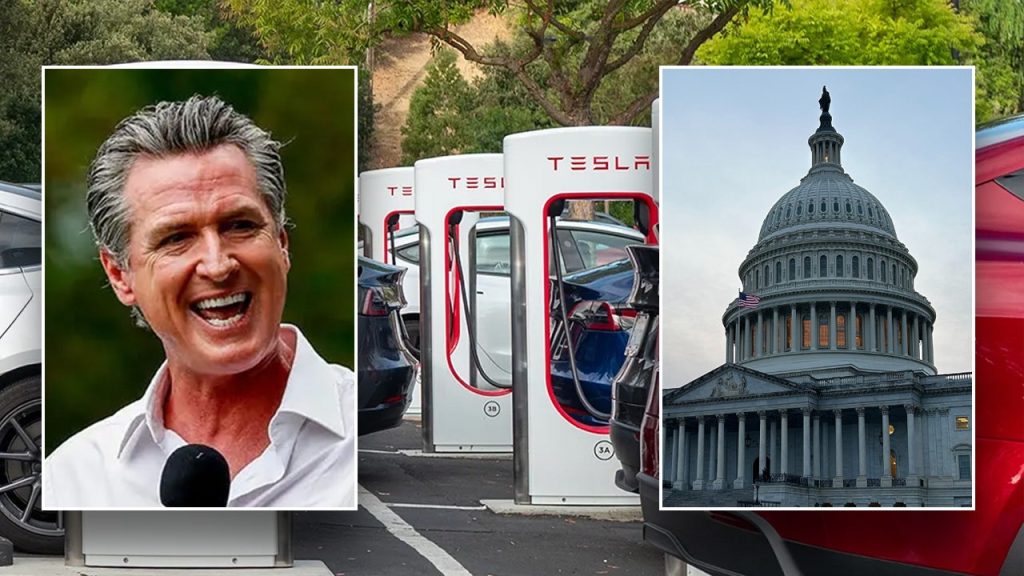In a significant legislative move, President Donald Trump is poised to sign a resolution that could revoke California’s waiver from the Environmental Protection Agency (EPA), which mandates the cessation of gasoline-powered car sales by 2035. This proposal is fostering a strong backlash from state officials led by Governor Gavin Newsom, who argue that the action constitutes an overreach of congressional authority. State Republican legislators, however, advocate the resolution as a critical step towards reducing regulatory burdens in California.
| Article Subheadings |
|---|
| 1) Background on California’s Environmental Goals |
| 2) The Republican Perspective on Regulation |
| 3) Legal Challenges Set to Emerge |
| 4) Rising Gas Prices and Energy Concerns |
| 5) Public Response and Future Implications |
Background on California’s Environmental Goals
California has long been a front-runner in implementing ambitious environmental legislation, with a goal established to halt sales of gasoline-powered vehicles by 2035. This initiative is rooted in the state’s anxiety over climate change, air pollution, and the detrimental components of fossil fuels on the environment. The underlying goal is to transition towards electric vehicles (EVs), positioned not just as a response to environmental issues but also as a strategy to invigorate the state’s economy through innovation. Governor Gavin Newsom has consistently advocated for this vision, underscoring California’s commitment to sustainability and moral leadership in the fight against climate change.
The Republican Perspective on Regulation
In contrast, Republicans, particularly those in the California State Legislature, are raising vocal concerns about the implications of such regulations on everyday residents. California State Senator Tony Strickland publicly expressed relief at the potential federal intervention, claiming that it provides a necessary counterbalance to what he describes as unchecked state regulations that are burdensome to constituents. The argument hinges on the assertion that the rapid push towards electric vehicle adoption lacks the requisite infrastructure to support it. Strickland emphasized that the state is currently grappling with energy shortages and blackouts, complicating the transition to EVs further.
Legal Challenges Set to Emerge
As discussions escalate, California officials, including Governor Newsom and Attorney General Rob Bonta, are preparing to challenge the federal resolution in court. They argue that utilizing the Congressional Review Act to overturn the waiver is an illegal maneuver, asserting that such waivers do not count as formal rules and therefore should not fall under the scope of the Act. As Newsom noted, more than 20 suits against the Trump administration have been initiated by the state. This legal backdrop not only raises questions about the consequences of the resolution but also about the broader implications of federal versus state authority in environmental governance.
Rising Gas Prices and Energy Concerns
The intersection of rising gas prices and energy reliability further complicates the narrative. With reports suggesting that some California refineries may close, concerns over fuel availability are intensifying. Governor Newsom is attempting to navigate this dual challenge—combating high fuel prices while promoting an accelerated transition to electric vehicles. The precariousness of this transition is scrutinized not only in terms of the economic burden on consumers but also about reliable energy supply. Many residents are anxious about the potential for rolling blackouts exacerbated by greater dependence on electrical power due to EVs. Consequently, the state’s energy policy is under increased scrutiny.
Public Response and Future Implications
The public’s reaction to these developments has been mixed. Some Californians are supportive of innovative approaches to environmental stewardship, while others are wary of the economic ramifications associated with swift transitions to electric vehicles. The state’s leaders, including Newsom, express a belief in the EV market’s growth and potential to enhance air quality, but skeptics worry whether economically disadvantaged households can shoulder the transformations required. Ultimately, the state’s future trajectory regarding transportation and energy is shaping up to be a contentious battleground between progressive green policies and conservative calls for fiscal prudence.
| No. | Key Points |
|---|---|
| 1 | President Trump may revoke California’s EPA waiver requiring an end to gasoline vehicle sales. |
| 2 | Governor Newsom and state officials criticize this move as an illegal congressional overreach. |
| 3 | Republican legislators argue that such regulations impose unnecessary burdens on Californians. |
| 4 | Legal challenges from California officials are expected regarding the congressional resolution. |
| 5 | Concerns over rising gas prices and energy capacity persist amid the push for electric vehicles. |
Summary
The looming federal intervention regarding California’s environmental regulations reflects a broader clash between state and federal authority over climate initiatives. As state leaders prepare to challenge this congressional action, the implications for energy reliability and economic burdens on consumers are paramount in discussions. The intersection of rising gas prices and the push for electric vehicles complicates the narrative, ensuring that this debate will continue to evolve with significant ramifications for California’s future.
Frequently Asked Questions
Question: What is the main goal of California’s environmental regulation regarding vehicles?
The primary aim is to phase out gasoline-powered vehicle sales by 2035 and promote electric vehicles to combat climate change and improve air quality.
Question: How are Republican leaders responding to California’s regulations?
Republican leaders argue that these regulations overburden the public and are economically unfeasible, particularly given California’s energy challenges.
Question: What legal actions are California officials considering?
California officials plan to challenge the potential revocation of the EPA waiver in court, claiming it represents an illegal use of the Congressional Review Act.


